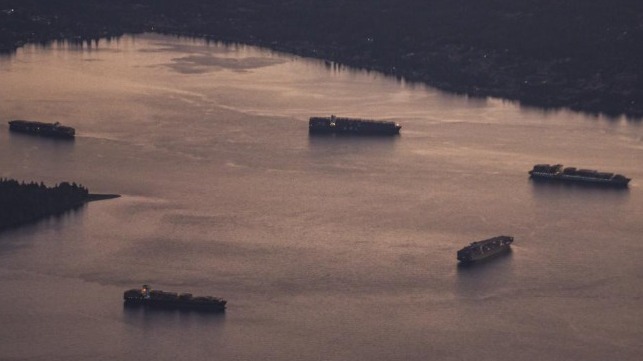
While the record backlog of vessels building off Southern California continues to draw extensive attention, ports all along the Pacific Coast are also reporting the impact of the congestion. The U.S. Coast Guard and Puget Sound Vessel Traffic Service are highlighting some of the challenges they are facing managing the surge in vessels into the area.
This unprecedented backlog has resulted in a greater number of ships, in particular container ships, utilizing anchorages in Puget Sound. There are currently eight vessels in the anchorages on the Puget Sound, meaning that the area is two-thirds full as vessels wait for terminal space at the ports in Seattle and Tacoma.
The Salish Sea and Puget Sound are deep waters areas says Laird Hail, director, Puget Sound Vessel Traffic Service. “However, the deep waters limit the number of locations we can use for anchorages. Container ships have gotten larger since some of our anchorages were established, and as a result, many of the anchorages are no longer suitable for these ships.”
Due to a lack of capacity available elsewhere, the Coast Guard and traffic service have been directing vessels to Holmes Harbor, off Whidbey Island. While Holmes Harbor is designated as a federal anchorage, the Coast Guard does not generally need to use Holmes Harbor. This is similar to several other anchorages, such as Bellingham Bay and Port Gardner. The Coast Guard is working closely with Puget Sound Pilots in reviewing criteria that determine which vessels can use specific anchorages.
“Holmes Harbor is way off the beaten path requiring lengthier rides for vessel pilots and is further from the vessels’ ultimate destination,” said Hail. “We’ve only used Holmes Harbor once before on a similar basis in the last 15 to 20 years, and that was during the 2014-2015 slowdown caused by labor disputes resulting in a similar backup. As soon as the congestions resolves to where it is not necessary to use Holmes Harbor, we will return to using it only as an overflow location.”
The ships waiting in the bay have become a bit of a local tourist attraction, but the Coast Guard is also reporting that residents unfamiliar with the large vessels at anchor has resulted in an increased number of reports of excessive noise and lights from vessels anchored at various anchorages in Puget Sound.
The Coast Guard is advising residents calling in that the vessels generally do not run their propulsion engines unless they need the ability to maneuver unless it is excessively windy and the vessels fear dragging anchor. The low hum noises they are telling residents are likely due to generators, which container ships use to produce electricity.
Complaints of light pollution are being met with nightly radio broadcasts from the reminding vessels to use only necessary lighting while in the anchorage. The pilots are also discussing light usage before they leave the vessel after guiding them into the anchorage. The Coast Guard says while deck lights are necessary for safety, ships should not be using bright halogen or similar type lights.
The Captain of the Port is encouraging container ship stakeholders such as the Northwest Seaport Alliance, the Pacific Merchant Shipping Association, the Port of Seattle, Port of Tacoma, and terminal operators to develop new processes for container ship queuing to manage vessel arrivals efficiently and reduce the demand and load on anchorages.
SOURCE READ THE FULL ARTICLE
https://www.maritime-executive.com/article/puget-sound-highlights-challenges-of-managing-containership-backlog